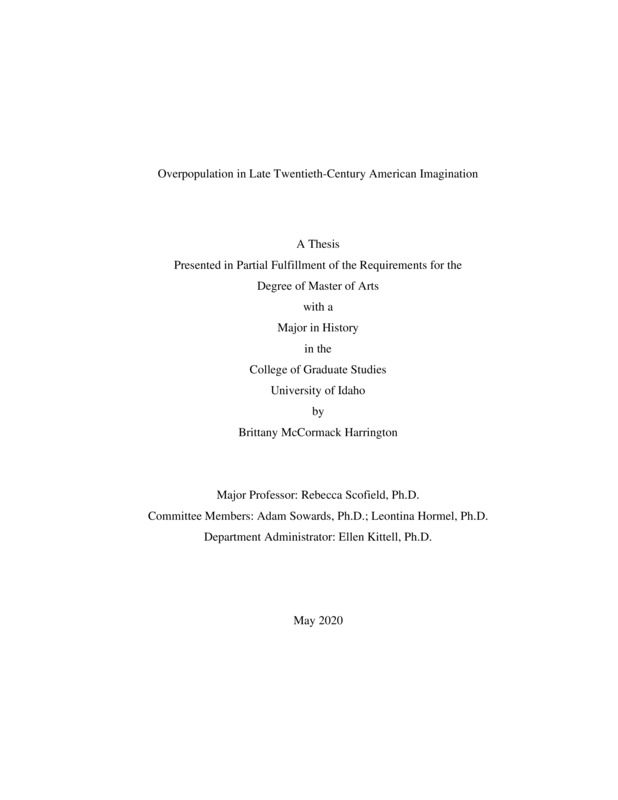Overpopulation in Late Twentieth-Century American Imagination
Harrington, Brittany McCormack. (2020-05). Overpopulation in Late Twentieth-Century American Imagination. Theses and Dissertations Collection, University of Idaho Library Digital Collections. https://www.lib.uidaho.edu/digital/etd/items/harrington_idaho_0089n_11874.html
- Title:
- Overpopulation in Late Twentieth-Century American Imagination
- Author:
- Harrington, Brittany McCormack
- Date:
- 2020-05
- Keywords:
- Fear Overpopulation Popular Science Public Perception Science Fiction Twentieth Century
- Program:
- History
- Subject Category:
- American history; Mass communication; Film studies
- Abstract:
-
Overpopulation caught the attention of scientists, popular science authors, and science fiction creators alike in the second half of the twentieth century. Overpopulation embodied the disaster that would finally bring about the end of the world as they knew it. Concerns varied between the groups, but generally focused on standards of living, quality of life, gender roles, reproduction, freedom, or access to a healthy natural world. Science writers and science fiction creators worried that society did not effectively understand the devastating potential of overpopulation and played upon Americans’ fear of loss to try to induce a greater response to the threat of overpopulation. A Gallop poll in 1971 showed that 46 percent of respondents said U.S. population growth was a major problem. Though, not everyone agreed that overpopulation posed a threat. Those who believed in the overpopulation menace could not agree on how to address it. There was no unified path forward. Americans, clear from newspaper articles discussing the country’s policies, did not want to implement the same population control tactics as communist China, but neither did most Americans want to share or give up any resources. Any measure to end the threat of overpopulation seemed too extreme and failure seemed unavoidable with either controlling reproduction or not acting. The scale of the problem of overpopulation also felt daunting. The American public felt largely separated from most of the negative effects of overpopulation. Many within the U.S. public eventually saw overpopulation as a sort of trope.
- Description:
- masters, M.A., History -- University of Idaho - College of Graduate Studies, 2020-05
- Major Professor:
- Scofield, Rebecca
- Committee:
- Sowards, Adam; Hormel, Leontina
- Defense Date:
- 2020-05
- Identifier:
- Harrington_idaho_0089N_11874
- Type:
- Text
- Format Original:
- Format:
- application/pdf
- Rights:
- In Copyright - Educational Use Permitted. For more information, please contact University of Idaho Library Special Collections and Archives Department at libspec@uidaho.edu.
- Standardized Rights:
- http://rightsstatements.org/vocab/InC-EDU/1.0/

